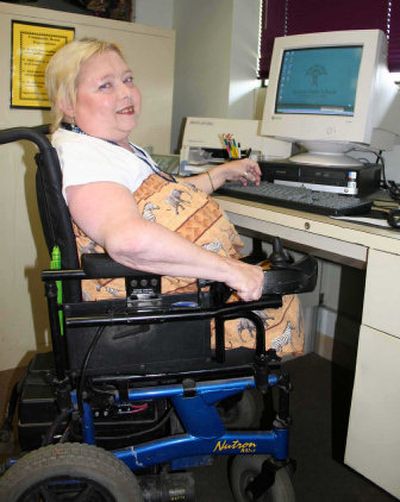She’s the volunteers’ volunteer

What’s that they say? If you need something done, get a busy person to do it.
COPS West and Spokane Public Schools have found that to be true with Louise Stamper.
When there was a need for a coordinator of volunteers at Holmes Elementary School, where her son Caleb attended, Stamper was first to raise her hand.
When the McGruff safe house program fell into a bit of disrepair, Stamper was knocking at the door of the West Central COPS (Community-Oriented Policing Service) shop, offering her time.
Meanwhile, in her spare time, Stamper completed a two-year degree at Spokane Falls Community College, studying journalism. She has been accepted at Gonzaga University for this fall.
Perhaps the most amazing part of this busy woman’s life is that Stamper, a married mother of three boys, does it all from a wheelchair.
Stamper, 47, was confined to a wheelchair after suffering from rheumatoid arthritis. Now, she is seat-belted in after steroid treatment forced doctors to perform amputation of both her legs.
After enduring infections that simply would not go away, Stamper said, the “doctor suggested amputation. I was quite happy to do that.”
Stamper received prosthetic legs and walked successfully for about eight months. But on the way home from a COPS meeting, she was in a car accident and the prosthesis smashed a knee.
“The right knee – they couldn’t save it, so they amputated,” Stamper said.
“I have this wonderful electric wheelchair that I get around in everywhere just fine.”
There’s no point in feeling sorry for herself, Stamper said. “There are so many worse things to get you down. Mental illness, HIV… .”
“I volunteer 40 hours a week and enjoy every second of it,” Stamper said.
“The school district does not have funding to pay volunteer coordinators. They needed a McGruff representative at the school. And they needed a coordinator (for McGruff) at COPS West, so I thought it would be a hell of a lot easier to meet with myself,” Stamper said with a laugh.
“I might as well step in and do it,” Stamper said. “I know everybody, and it’s something I can just add on,” she said matter-of-factly.
The McGruff program that once had several hundred participants has shrunk to 132 houses. “We have 20 houses now” in the West Central neighborhood, she said.
Stamper would like to have at least 50 houses by the end of this year. “Then, hell, why stop at a house on every block?” she asked.
Becoming a McGruff safe house is “not a terribly difficult thing to do,” Stamper said. Residents have to pass a background check.
Born in South Africa, Stamper arrived in the United States at age 19 in 1978. After five years in New York, she decided to become a U.S. citizen, bought a Greyhound bus ticket and set out to see the country.
“I got stuck in Los Angeles when there was a bus strike,” Stamper said. It was there she met her future husband, Donald, in a coffee shop.
The couple lived for 10 years in California, where they started their family with sons Joshua, now 18, and Jacob, 14.
But “we decided not to raise our sons there,” Stamper said.
The company where she worked opened an office in Spokane. “I called a friend to see if there were jobs,” Stamper recalled. ” ‘For you, yes,’ ” her friend said.
“We moved right into West Central, not knowing really anything. We found a great house for rent across the street from a cute little park,” she said.
Shortly after moving in, Stamper learned that two girls from the neighborhood had been kidnapped and killed. That’s when she began her volunteer quest with COPS West, the school district and many other programs.
“Safe houses have been around for decades. They have a (McGruff) poster in the window,” said Maurece Vulcano, Spokane COPS program coordinator.
They are designed to be a safe place for children to go if they are locked out of their house, being followed or have been injured.
They are a place where kids can go if they are in an emergency situation. However, they are not places to get warm or go for potty breaks, and they are not to be a “snack stand,” Vulcano said.
McGruff safe houses once were administered by the Spokane Police Department, but budget cuts forced reorganization of the program.
Spokane COPS took over the rebuilding of the safe house program. “McGruff houses fit so well with community-oriented policing,” Vulcano said.
Each COPS shop has a safe-house coordinator working with a similar person at the neighborhood school.
Participants must fill out applications. “Everyone in the house 12 years and older must pass a criminal background check,” Vulcano said.